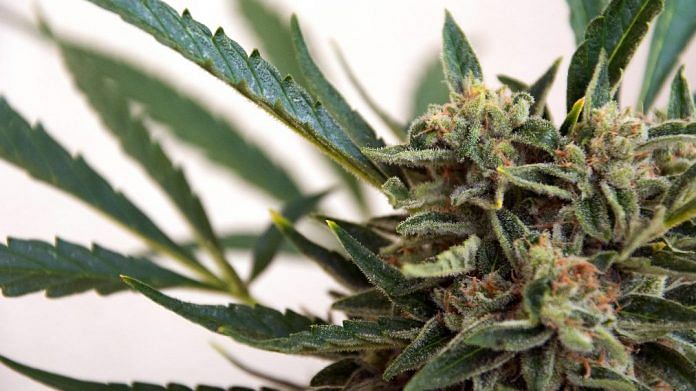Cannabis has a lot of medical benefits, and a non-addictive compound called cannabidiol is the way to push for legalising it.
New Delhi: Legalising marijuana is a topic that has generated much debate in India of late, with many scientists as well as public figures like Congress MP Shashi Tharoor advocating it. Scientists now say they are building a solid case to get it legalised soon, and say they will introduce their final proposal in about one and a half years.
At a press conference held Friday by the Jammu-based Council of Scientific and Industrial Research-Indian Institute of Integrative Medicine (CSIR-IIIM), in association with the Bombay Hemp Company, scientists, lawmakers and experts explained that the way forward for cannabis was through a compound called cannabidiol (CBD).
“We need to prove beyond doubt that cannabis is beneficial. For that, we need to take the medical route. Once you show its benefits in the medical sector in front of the policymakers, they will be open to it. Then you move to the industrial sector and others,” said Dr Rajendar Pal Singh, former deputy director-general (north zone) in the Narcotics Control Bureau.
Cannabis has been a part of Indian culture since the days of the Indus Valley Civilisation, when it was regarded as a sacred plant. Cannabis and its various forms (hashish, ganja, charas) have been banned in India since 1986, when the Narcotics Drugs and Psychotropic Substances (NDPS) Act came into effect.
Also read: High time India, the land of bhang, legalises marijuana
What CBD can do
Tetrahydrocannabinol (THC) is the psychoactive component of cannabis, which though addictive, is helpful in easing pain, reducing risks of nerve damage and suppressing muscle spasms.
CBD, on the other hand, is known to be the non-psychoactive component of cannabis, which reduces Dravet seizure, kills breast cancer cells, stimulates bone growth and stops inflammation.
According to the scientists, CBD components are also useful for fighting alcohol, tobacco and THC addictions.
“Cannabis can put you in a state of bliss and a state of bliss is preferred while treating tumors in a patient because he doesn’t react,” said Rajendra Badwe, director at the Tata Memorial Centre.
“A large portion of India has huge mental health problems. Cannabis has the potential to treat depressional anxiety, and tests have already begun.”
Dr Anurag Srivastava, head of surgery at AIIMS, added: “Almost all cancer patients are depressed. Cannabis helps in mood elation and improves appetite in patients.”
IIIM was the first institute in India to get a licence for cannabis cultivation, with the objective of research. The institute is now working on the development of CBD for pain management in sickle cell anaemia.
According to Dr Ram Vishwakarma, director of IIIM, the clinical trials for CBD are underway at the Tata Memorial Centre, and will be completed in a year.
Also read: Visiting Himachal Pradesh for a ‘Malana Cream’ or ‘chitta’ high? The CM has other plans
Hemp, super-crop of the future
Sanjay Kumar, director of CSIR’s Institute of Himalayan Bioresource Technology (IHBT) in Himachal Pradesh, talked up the importance of hemp, a variant of the cannabis plant that’s used primarily for its fibre. It can be used for medicinal purposes, as well as a biofuel due to its high cellulose content.
“This plant can offer so many things to the people at once. Hemp is the crop of the future,” said Kumar.
He explained that growing hemp was environment-friendly as well as ‘farmer-friendly’, as it needed a minuscule amount of water and did not need any pesticides for survival. He suggested that a farmer could earn Rs 12 lakh per hectare by cultivating hemp, if proper facilities were provided.
As of now, Uttarakhand is the only state which has been given licence to cultivate hemp commercially. “Where farmers aren’t able to produce anything on their land, this is the crop that gives them opportunity,” said Kumar.
Hemp is also a candidate for substituting the tobacco crop, because of the qualities mentioned above.
Also read: By prohibiting marijuana, India is giving free run to illegal drug cartels: Shashi Tharoor
It’s in our roots
Various experts on the panel spoke about reintroducing cannabis into Indian culture, with Kumar pointing out that “tobacco and alcohol can be controlled by this plant of Lord Shiva”.
Bhang, an edible preparation of cannabis, is regularly used in festivals like Holi and Shivratri. Bhang usage is regulated by the government by the National Policy on Narcotics and Psychotropic Substances.
However, the regulations and bans have not been able to control the rampant abuse of narcotics, especially synthetic drugs, in Punjab and the Northeast.
According to Dr Dharam Vira Gandhi, the Lok Sabha MP for Patiala, legalising cannabis will help combat abuse of drugs like heroin and cocaine.



